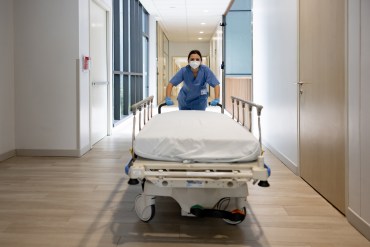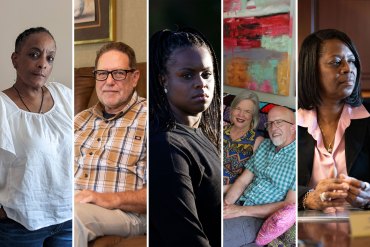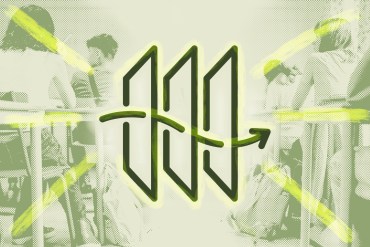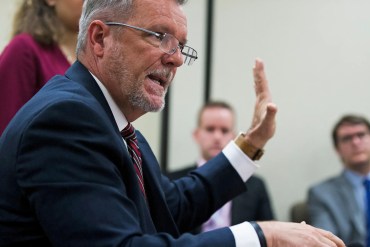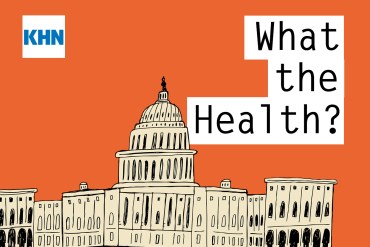In America, Cancer Patients Endure Debt on Top of Disease
Medical breakthroughs mean cancer is less likely to kill, but survival can come at an extraordinary cost as patients drain savings, declare bankruptcy, or lose their homes, a KHN-NPR investigation finds.
The Search for Scarce Formula Is Worse for Rural Families on WIC
Constraints imposed by the Special Supplemental Nutrition Assistance Program for Women, Infants, and Children, known as WIC, that prevent recipients from using benefits to buy formula across state lines weigh on families as the nationwide formula shortage drags on.
The Push for Abortion Lawmaking After ‘Dobbs’ Is Unique, Legal and Political Experts Say
The surge of calls for special legislative sessions to pass abortion laws is an unusual occurrence in modern U.S. history, according to experts — one caused by the Supreme Court’s decision to give states more power to regulate abortion.
Feds Want a Policy That Advocates Say Would Let Hospitals Off the Hook for Covid-Era Lapses
The pandemic disrupted all sense of normalcy for U.S. hospitals, so federal officials are proposing to pause financial penalties against the facilities and to block public access to key hospital safety data — such as the frequency of falls and sepsis — because of concerns that the data isn’t accurate enough. But consumer advocates are furious about the proposal.
Watch: Crossing State Lines for Abortion Care
Illinois is one of the few states in the middle of the country where people can still legally access abortion care.
Upended: How Medical Debt Changed Their Lives
People talk about the sacrifices they made when health care forced them into debt.
Race Is Often Used as Medical Shorthand for How Bodies Work. Some Doctors Want to Change That.
Physicians have long believed it’s good medicine to consider race in health care. But recently, rather than perpetuate the myth that race governs how bodies function, a more nuanced approach has emerged: acknowledging that racial health disparities often reflect the effects of generations of systemic racism, such as lack of access to stable housing or nutritious food.
States Fight Student Mental Health Crisis With Days Off
In early 2022, Illinois joined a growing number of states where lawmakers and school leaders are trying to combat the ongoing student mental health crisis by granting days off for mental health needs.
Covid Funding Pries Open a Door to Improving Air Quality in Schools
Researchers say the billions in pandemic funding available for ventilation upgrades in U.S. schools provides a once-in-a-generation opportunity to combat covid-19, as well as making air more breathable for students living with allergies, asthma, and chronic wildfire smoke.
They Thought They Were Buying Obamacare Plans. What They Got Wasn’t Insurance.
Some consumers who think they are signing up for Obamacare insurance find out later they actually purchased a membership to a health care sharing ministry. But regulators and online advertising sites don’t do much about it.
Montana Hires a Medicaid Director With a Managed-Care Past
Montana, one of about a dozen states still managing its own Medicaid programs, has a new Medicaid director who championed handing the management of the program to private companies in Iowa and Kansas.
Tribal Pharmacy Dispenses Free Meds and Fills Gaps for Native Americans in the City
The Mashkiki Waakaa’igan Pharmacy in downtown Minneapolis gives Native Americans an economical option for filling prescriptions while being sensitive to tribal traditions and expectations.
Caskets Wrapped in Colorful Images Pay Tribute to Young Lives Lost to Trauma and Violence
Mourners are wrapping caskets in imagery, similar to the way companies wrap logos around cars, trucks, and buses. Across the country, casket-wrap companies create custom designs, too often for grieving parents who have lost their children to gun violence.
Bison Pastrami, Anyone? Preschool Assistant Makes Sure Kids Get to Know Indigenous Foods
Fawn Youngbear-Tibbetts wants youngsters to connect with their Native American culture and eat more nutritious foods.
Why So Slow? Legislators Take on Insurers’ Delays in Approving Prescribed Treatments
Insurers say prior authorization requirements are intended to reduce wasteful and inappropriate health care spending. But they can baffle patients waiting for approval. And doctors say that insurers have yet to follow through on commitments to improve the process.
KHN’s ‘What the Health?’: The Invisible Pandemic
Covid cases are again climbing, but you wouldn’t know it from the behavior of public health and elected officials, much less the general public, all of whom seem to want to put the pandemic in the rearview mirror. Meanwhile, the fallout over the leaked Supreme Court draft opinion on abortion continues even as the Senate fails — again — to muster the votes to write abortion rights into law. Joanne Kenen of the Johns Hopkins Bloomberg School of Public Health and Politico, Alice Miranda Ollstein of Politico, and Sandhya Raman of CQ Roll Call join KHN’s Julie Rovner to discuss these issues and more. Plus, for extra credit, the panelists suggest their favorite health policy stories of the week they think you should read, too.
Downsized City Sees Its Health Care Downsized as Hospital Awaits Demolition
A 124-year-old hospital in a midsize Rust Belt city in Indiana will soon be torn down, despite protests from residents and city officials decrying the loss of local health services. The Catholic hospital system said it is downsizing the 226-bed hospital because of a lack of demand for inpatient care, as the organization has been building new hospitals in wealthier suburbs.
Anti-Vaccine Ideology Gains Ground as Lawmakers Seek to Erode Rules for Kids’ Shots
Legislators in Kansas are pushing bills to expand exemptions for school vaccines, allowing religious exemptions for all vaccine requirements in the state’s schools without families having to provide any proof of their beliefs. Similar bills are being introduced around the nation as the anti-vaccine movement gains traction among politicians.
KHN’s ‘What the Health?’: Finally, a Fix for the ‘Family Glitch’
President Joe Biden welcomed former President Barack Obama back to the White House this week to announce a new policy for the Affordable Care Act that would make subsidies available to more families with unaffordable employer coverage. Meanwhile, Congress struggled to find a compromise for continued federal funding of covid-19 vaccines, testing, and treatments. Tami Luhby of CNN, Shefali Luthra of The 19th, and Jessie Hellmann of CQ Roll Call join KHN’s Julie Rovner to discuss these issues and more.
Patients’ Perilous Months-Long Waiting for Medicaid Coverage Is a Sign of What’s to Come
The pandemic crisis has overwhelmed understaffed state Medicaid agencies, already delaying access to the insurance program in Missouri. As the public health emergency ends, low-income people nationwide could find it even harder to have coverage.






